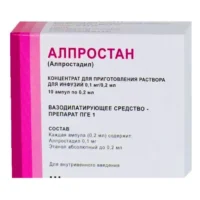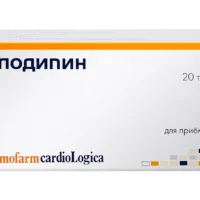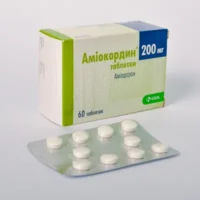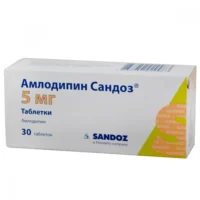Description
Indapamide Capsules 2.5 mg. №30
Composition
Indapamide capsules contain 2.5 mg of Indapamide as the active ingredient.
Mechanism of Action
Indapamide is a thiazide-like diuretic that inhibits the reabsorption of sodium and chloride ions in the distal convoluted tubules of the kidneys. This leads to increased excretion of water and electrolytes, resulting in reduced blood volume and peripheral resistance, ultimately lowering blood pressure.
Pharmacological Properties
Indapamide acts by promoting diuresis and vasodilation, contributing to its antihypertensive effects. It is well-absorbed orally and has a half-life of approximately 14-24 hours.
Indications for Use
Indapamide capsules are indicated for the treatment of high blood pressure (hypertension) in adult patients.
Contraindications
Avoid using Indapamide capsules if you are allergic to Indapamide or if you have severe kidney disease. It is important to consult with a healthcare provider before initiating treatment.
Side Effects
Common side effects of Indapamide capsules may include dizziness, lightheadedness, electrolyte imbalances, and gastrointestinal disturbances. If you experience any severe or persistent side effects, seek medical attention promptly.
Usage Instructions
The recommended dosage of Indapamide capsules is one 2.5 mg capsule taken orally once daily, preferably in the morning. Swallow the capsule whole with a full glass of water.
Benefits Compared to Analogues
Indapamide has demonstrated efficacy in lowering blood pressure and reducing the risk of cardiovascular events. Its longer half-life compared to some analogues allows for once-daily dosing, improving patient adherence to treatment regimens.
Suitable Patient Groups
Indapamide capsules are suitable for use in adult patients, including the elderly population. Dosage adjustments may be necessary in patients with impaired renal function. Use in pediatric patients should be determined by a healthcare provider.
Storage and Shelf Life
Store Indapamide capsules in a cool, dry place at room temperature. Keep the medication out of reach of children and pets. Check the expiration date on the packaging and do not use the product if expired.
Packaging Description
Each package of Indapamide capsules contains 30 capsules of 2.5 mg strength. The packaging is designed to protect the capsules from light and moisture, maintaining their stability and efficacy.
Clinical Evidence and Proven Effectiveness
Indapamide has been extensively studied in clinical trials for its antihypertensive properties. Research published in the Journal of Hypertension demonstrated the long-term efficacy and safety of Indapamide in managing hypertension. Additionally, a study in the American Journal of Medicine highlighted the cardiovascular benefits of Indapamide-based therapy, showing a significant reduction in cardiovascular events compared to placebo.





